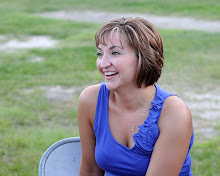I actually did not know that such a day existed, until last night when I saw mention of it on Facebook.
I think it's pretty great that PTSD gets a "day"... although hopefully sometime in the very near future, we won't need a "day".... hopefully everyone will just understand and accept PTSD for what it is.
Because this is something that affects my husband's life on a daily basis (whether he chooses to admit it or not) I've made a point to educate myself as much as possible. My thought process is, if I am going to deal with this, I might as well know as much about it as possible. Luckily for me, information, help, and resources are becoming more and more available to us all.
It's so important that we are all educated about PTSD. This is not something that just affects the military- this can happen to any of us, as the direct result of traumatic events in our lives. We need to be understanding, accepting, and educated, so we can help those that we love deal with this issue. As I've said before, the stigma of it all just needs to go away. There is NOTHING wrong with asking for help. EVER. Especially for something as serious as PTSD.
Here is a list of things that we, as family, friends, and caregivers can do to help those who may be dealing with PTSD:
Ten ways community members can help-
- Understand that anyone can experience trauma, such as accidents, assault, war, or disasters.
- Think broadly. When trauma happens, the survivor's family, friends, coworkers, and community are affected.
- Learn about common reactions to trauma and readjustment to life outside a war zone.
- Be aware of where get help for trauma survivors, Veterans, and people with PTSD.
- Expand your understanding of how PTSD is identified and treated.
- Know that treatment for PTSD works.
- Ask a Veteran or trauma survivor if talking would help, but do not push if someone is not ready to discuss things.
- Realize that stigma is a barrier to getting treatment. Getting people to talk or seek help is not always easy. Your encouragement matters.
- Know the facts. More than half of US adults will experience trauma in their lifetime. About 7% of adults will deal with PTSD at some point. For Veterans and male and female sexual assault survivors, the figure is higher.
- Connect with self-help resources, apps, and videos about PTSD.
Number 7 on that list is so important- and part of the reason I believe that Randy and I have been able to begin to overcome his PTSD. From the moment he stepped off the bus in 2004, he has know that I am always willing to listen, and am always here for him. I'm not sure where we would be if, at times, I hadn't pushed as hard as I did, or been as stubborn as I am.
This list comes from http://www.ptsd.va.gov/. This website has a lot of great resources and other websites that are helpful for the returning servicemember, and family and friends.






No comments:
Post a Comment